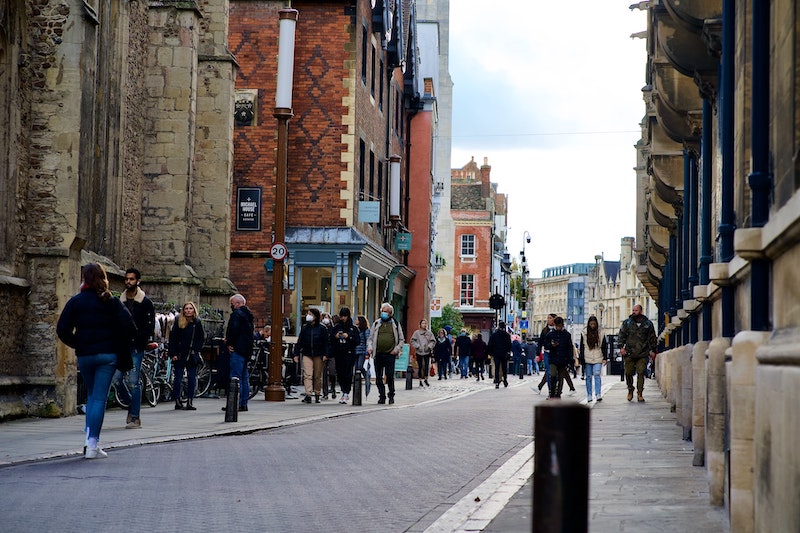Poverty in Cambridge: The UK’s Most Unequal City

As of 2020, Cambridge stood as the “U.K.’s most unequal city” — a surprising ranking considering that the city is famous for its university and education system. Cambridge is one of the U.K.’s most unaffordable cities to live in and food insecurity and homelessness are becoming more prevalent. Efforts to reduce levels of inequality and poverty in Cambridge are currently underway.
Even before the COVID-19 pandemic, “one in every six children in Cambridgeshire” endured poverty. By March 2020, 33,449 children lived “below the breadline in the country,” CambridgeshireLive reported. It is also important to consider that this statistic does not account for the cost of housing, meaning the number is likely higher.
The Social Mobility Index has assessed the likelihood that “a child from a disadvantaged background will do well at school and get a good job across each of the 324 local authority district areas of England,” a briefing note from the Cambridge City Council says. The Social Mobility Index 2016 ranks Cambridge as a “social mobility coldspot,” which describes “the worst performing 20[%] of local authorities.” The report notes that Cambridge has “weaknesses in education for disadvantaged children but relatively good performance on adulthood measures.”
Geographical Divisions
Poverty in Cambridge is also geographically disparate. The Equality Trust reported that poverty is most prevalent in the northern and eastern parts of Cambridge. Furthermore, “the difference in life expectancy between the highest ranked neighborhood compared to the lowest is around 10 years.”
The Guardian notes that inequalities in Cambridge reflect the “town and gown” divide in the city, a phrase coined to express the separation between city residents and university students. “Academics are protected from the worst financial pressures of living in Cambridge, benefiting from central, subsidized college accommodation, free meals and access to a cheap, university-backed shared equity mortgage scheme,” the Guardian said.
The inequality is evident when considering that the 31 colleges in Cambridge had a collective wealth of about £6.9 billion in 2018. Community initiatives on the part of Cambridge’s tertiary institutions would contribute to reducing levels of poverty and inequality.
Cambridge City Council’s Efforts
The Cambridge City Council looks to reduce inequality and poverty in Cambridge through its vision “One Cambridge – Fair for All.” This vision includes addressing social exclusion and poverty and merging “town and gown.” This vision will undergo implementation in the Council’s corporate plan for 2022 to 2027.
The Cambridge City Council also has in place an Anti-Poverty Strategy for 2020 to 2023. The previous Anti-Poverty Strategy that the Cambridge City Council implemented in 2014 noted progress in several areas, including building council-owned residential homes leased at affordable rates and raising the incomes of lower-income families.
The Cambridge Food Poverty Alliance and Cambridge 2030
Cambridge Sustainable Food is a partnership of organizations working to alleviate food insecurity in the city. It leads the Cambridge Food Poverty Alliance (CFPA), formed in October 2017. Through an action plan, the CFPA aims to meet several food security objectives. One of the goals listed in the action plan is guaranteeing daily access to food for children across an entire year. The objectives under this goal include “funding for [three] community fridges and an associated surplus distribution scheme” as well as “funding for ingredients for holiday lunches across the city.”
Other key focus areas in their scheme include raising “the uptake of a living wage” and expanding the uptake of cost-free school meals among eligible students. These aims will lead to greater household incomes and ensure children make the most of their state-entitled food provisions for better health and educational outcomes.
Cambridge 2030 aims to “bring together the public, private, voluntary and community sectors in collaborative action to bridge gaps in the provision of resources” in Cambridge. The Cambridge 2030 website states that the central goal of the “first phase of action” is “promoting wellbeing, beginning before birth.” The initiative brings together many organizations such as It Takes a city and Cambridge United to action its promises.
The efforts currently underway have the potential to significantly reduce poverty and inequality in Cambridge.
– Priya Maiti
Photo: Unsplash
